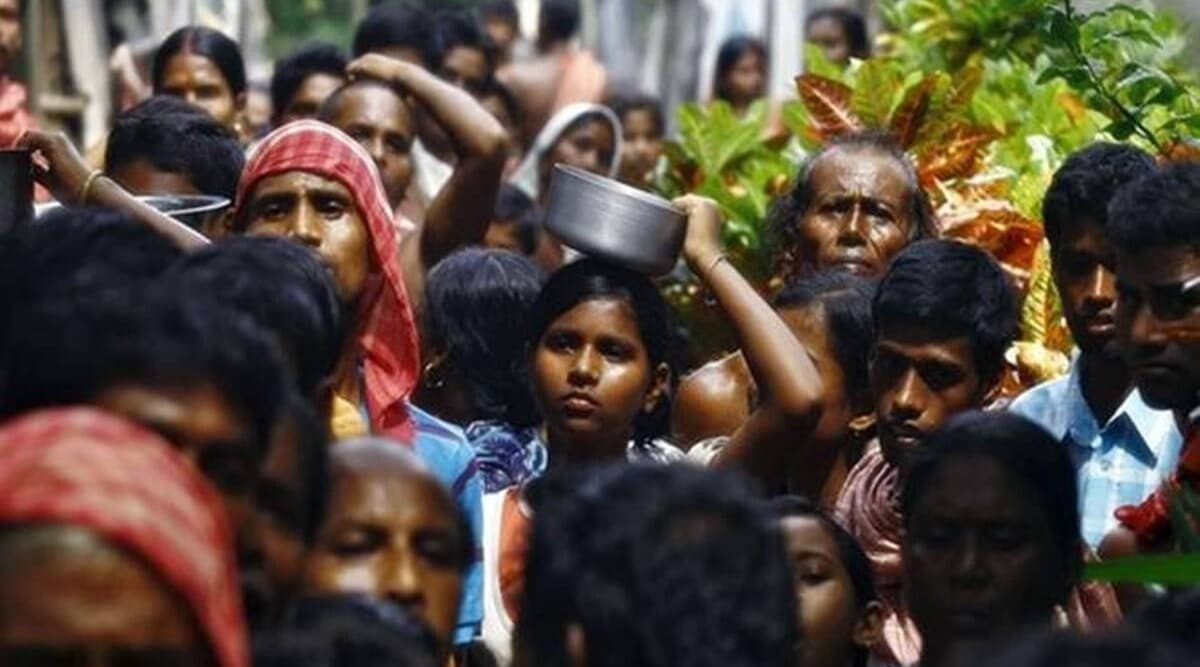
INDIA STANDS out as a “poor and really unequal nation, with an prosperous elite”, the place the highest 10 per cent holds 57 per cent of the entire nationwide earnings whereas the underside 50 per cent’s share is simply 13 per cent in 2021, in response to the most recent World Inequality Report 2022.
The report has additionally flagged a drop in international earnings throughout 2020, with about half of the dip in wealthy nations and the remaining in low-income and rising areas. That is attributed primarily as a result of impression of “South and Southeast Asia, and extra exactly” India.
“When India is faraway from the evaluation, it seems that the worldwide backside 50 per cent earnings share really barely elevated in 2020,” states the report authored by economist and co-director of the World Inequality Lab, Lucas Chancel, together with economists Thomas Piketty, Emmanuel Saez and Gabriel Zucman.
“Whereas the highest 10 per cent and high 1 per cent maintain respectively 57 per cent and 22 per cent of complete nationwide earnings, the underside 50 per cent share has gone right down to 13 per cent. India stands out as a poor and really unequal nation, with an prosperous elite,” the report states.
Based on the report, India’s center class is comparatively poor with a median wealth of solely Rs 7,23,930 or 29.5 per cent of the entire nationwide earnings, as in contrast with the highest 10 per cent and 1 per cent who personal 65 per cent (Rs 63,54,070) and 33 per cent (Rs 3,24,49,360), respectively.
The typical annual nationwide earnings of the Indian grownup inhabitants is Rs 2,04,200 in 2021. The underside 50 per cent earned Rs 53,610, whereas the highest 10 per cent earned over 20 instances extra (Rs 11,66,520), the report states. The typical family wealth in India is Rs 9,83,010, with the underside 50 per cent proudly owning virtually nothing, with a median wealth of 6 per cent of the entire Rs 66,280.
The share of high 10 per cent and backside 50 per cent in pre-tax nationwide earnings has remained broadly fixed from 2014 onwards. For India, the standard of inequality knowledge launched by the Authorities has significantly deteriorated, making it significantly tough to evaluate current inequality modifications, the report states.
As per the current Multi-dimensional Poverty Index (MPI) ready by Niti Aayog, one in each 4 folks in India was multidimensionally poor. Bihar has the best proportion of individuals (51.91 per cent of the state’s inhabitants) who’re multidimensionally poor, adopted by Jharkhand at 42.16 per cent and Uttar Pradesh at 37.79 per cent.
Based on the inequality report, international inequalities appear to be about as nice at the moment as they had been on the peak of Western imperialism within the early twentieth century. The poorest half of the worldwide inhabitants “barely owns any wealth” possessing simply 2 per cent of the entire, whereas the richest 10 per cent of the worldwide inhabitants personal 76 per cent of all wealth, it states.
The Center East and North Africa (MENA) are probably the most unequal areas on the planet, whereas Europe has the bottom inequality ranges, the report says. In Europe, the highest 10 per cent earnings share is round 36 per cent, whereas in MENA it’s 58 per cent. In East Asia, the highest 10 per cent makes 43 per cent of complete earnings and in Latin America the share is 55 per cent.
Based on the report, at the same time as nations have turn into richer over the past 40 years, their governments have turn into considerably poorer, a pattern which has been magnified as a result of pandemic.
“The share of wealth held by public actors is near zero or unfavourable in wealthy nations, which means that the totality of wealth is in personal palms. This pattern has been magnified by the Covid disaster, throughout which governments borrowed the equal of 10-20 per cent of GDP, basically from the personal sector,” it mentioned.
The report has urged levying a modest progressive wealth tax on multimillionaires. “Given the massive quantity of wealth focus, modest progressive taxes can generate important revenues for governments. In our state of affairs, we discover that 1.6 per cent of world incomes might be generated and reinvested in training, well being and the ecological transition,” it says.
In 2021, there have been 62.2 million folks on the planet proudly owning greater than $1 million (measured at market trade charges), the report states. Their common wealth was $2.8 million, representing a complete of $174 trillion and a world efficient wealth tax charge of 1.2 per cent might generate revenues of two.1 per cent of world earnings, it says.
On gender phrases, girls’s share of complete incomes from work (labour earnings) was about 30 per cent in 1990 and is lower than 35 per cent now, the report states.
The report additionally notes that inequalities inside nations are actually larger than these noticed between nations. On the identical time, the hole between the common incomes of the highest 10 per cent and the underside 50 per cent of people inside nations has virtually doubled. “This sharp rise in within-country inequalities has meant that regardless of financial catch-up and powerful progress within the rising nations, the world stays significantly unequal at the moment,” the report states.
Because the mid-Nineteen Eighties, deregulation and liberalisation insurance policies have led to some of the excessive will increase in earnings and wealth inequality on the planet, it mentioned. “Whereas the highest 1 per cent has largely benefited from financial reforms, progress amongst low and center earnings teams has been comparatively sluggish and poverty persists,” it states.


